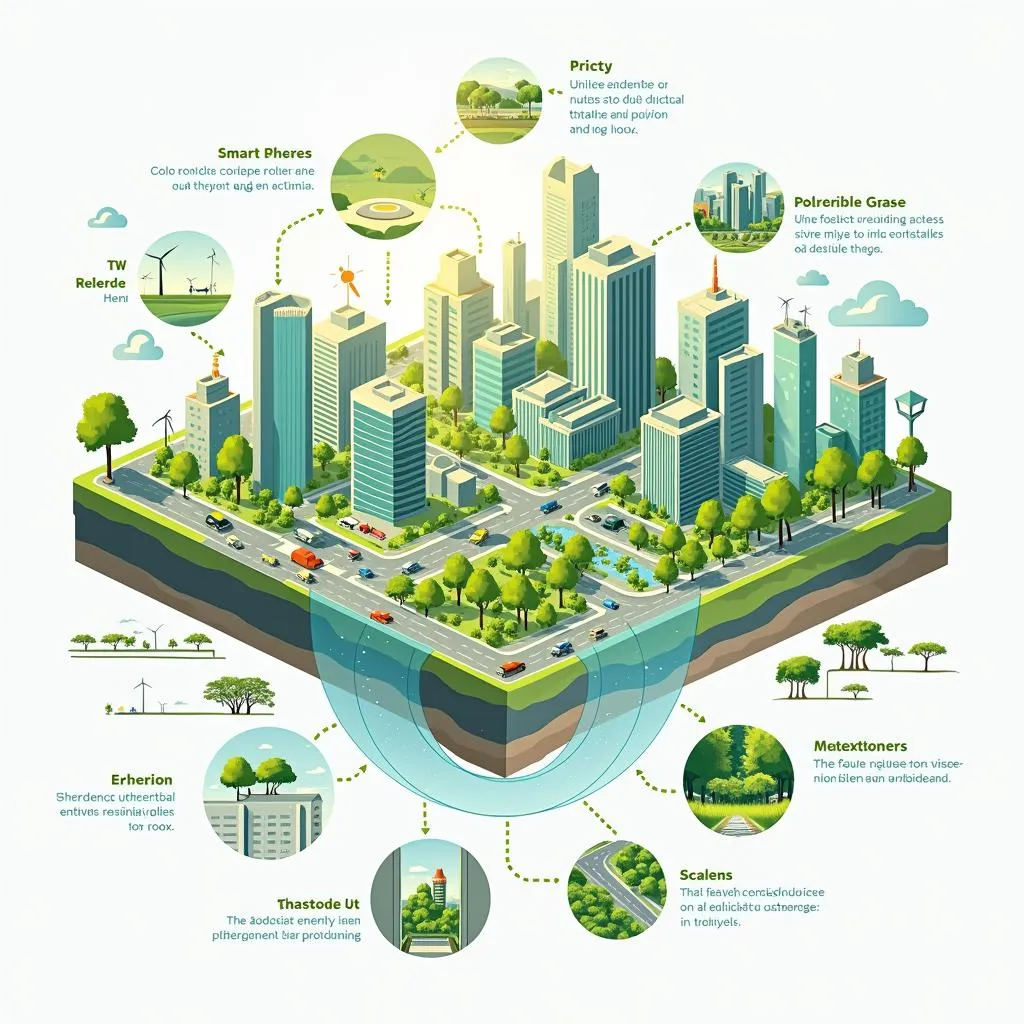Urban planning and its effects on community development is a topic that has gained significant traction in recent IELTS Writing Task 2 exams. Based on our analysis of past exam trends and predictions for future tests, this subject is likely to appear with increasing frequency. Let’s explore a real IELTS question on this theme and provide sample essays for different band scores.
Nội dung bài viết
Some people think that governments should focus on planning and developing rural areas rather than creating more large cities. To what extent do you agree or disagree?
Analyzing the Question
This question addresses the debate between urban and rural development, a crucial aspect of how urbanization affects social dynamics. It requires candidates to express their opinion on whether governments should prioritize rural development over urban expansion. Let’s break it down:
- Topic: Government focus on rural development vs. urban expansion
- Task: Agree or disagree (to what extent)
- Key points to consider:
- Pros and cons of rural development
- Advantages and disadvantages of large cities
- Balance between urban and rural growth
Sample Essays
Band 8-9 Essay
In my opinion, while developing rural areas is crucial, governments should not entirely shift their focus away from urban development. I believe a balanced approach that addresses both rural and urban needs is essential for sustainable national growth.
Undoubtedly, rural development deserves significant attention. Investing in rural infrastructure, education, and healthcare can reduce the urban-rural divide and stem the tide of rural-to-urban migration. This approach can lead to more equitable distribution of resources and opportunities across a country. Moreover, developing rural areas can help preserve traditional cultures and lifestyles while also ensuring food security through sustainable agriculture.
However, completely neglecting urban development in favor of rural areas would be short-sighted. Cities are often economic powerhouses, driving innovation, commerce, and cultural exchange. They attract talent and investment, which can benefit the entire country. Furthermore, well-planned cities can be more environmentally sustainable than sprawling rural developments, with efficient public transportation and energy systems.
The key lies in striking a balance. Governments should focus on creating smart, sustainable cities that maximize efficiency while minimizing negative impacts such as pollution and overcrowding. Simultaneously, they should invest in rural development, creating opportunities that allow people to thrive without necessarily migrating to urban centers. This balanced approach can lead to a more harmonious and equitable national development.
In conclusion, while rural development is crucial, it should not come at the expense of urban growth. A nuanced strategy that addresses both rural and urban needs is essential for comprehensive national development. This approach can lead to more resilient, equitable, and sustainable societies in the long run.
(Word count: 275)
 Balancing urban and rural development for sustainable growth
Balancing urban and rural development for sustainable growth
Band 6-7 Essay
I partially agree that governments should focus more on rural development, but I don’t think they should completely ignore large cities. Both rural and urban areas are important for a country’s growth.
Rural development is very important. Many rural areas lack good schools, hospitals, and job opportunities. If governments invest in these areas, it can stop people from moving to cities in large numbers. This can reduce overcrowding in cities and help preserve rural cultures. Also, developing rural areas can improve agriculture, which is important for food supply.
However, large cities are also crucial for a country’s economy. They attract businesses and create many job opportunities. Cities are often centers of education and innovation. They also generate a lot of tax revenue that governments can use for various development projects. If governments only focus on rural areas, they might miss out on the benefits that cities provide.
I think the best approach is to develop both rural and urban areas. Governments should improve rural infrastructure and create more opportunities in villages and small towns. At the same time, they should plan cities better to make them more livable and sustainable. This balanced approach can lead to overall national development.
In conclusion, while rural development is important, governments shouldn’t ignore large cities. A balanced approach that develops both rural and urban areas is the best way to ensure a country’s progress.
(Word count: 234)
Band 5-6 Essay
I agree that governments should focus on planning and developing rural areas instead of making more big cities. This is because rural areas often have many problems that need to be solved.
Firstly, rural areas often don’t have good schools, hospitals, and jobs. This makes life difficult for people living there. If the government improves these things, rural people will have better lives. They won’t need to move to cities to find good jobs or education.
Secondly, developing rural areas can help agriculture. This is important because agriculture provides food for the whole country. If rural areas are developed, farmers can use better technology and produce more food.
Thirdly, developing rural areas can help preserve traditional culture. Many old customs and traditions are found in villages. If people leave villages for cities, these traditions might be lost.
However, cities are also important. They provide many jobs and business opportunities. But I think there are already many big cities, and they have problems like pollution and overcrowding.
In conclusion, I believe governments should focus more on rural areas. This can solve many problems and help the whole country develop in a better way.
(Word count: 189)
Scoring Explanation
Band 8-9 Essay
This essay demonstrates excellent writing skills and a sophisticated approach to the topic:
- Task Response: The essay fully addresses all parts of the task, presenting a clear position with a nuanced perspective.
- Coherence and Cohesion: Ideas are logically organized with clear progression throughout the essay.
- Lexical Resource: A wide range of vocabulary is used accurately and appropriately (e.g., “stem the tide,” “equitable distribution”).
- Grammatical Range and Accuracy: Complex sentence structures are used accurately, with only minor errors.
Band 6-7 Essay
This essay shows good writing skills but lacks some of the sophistication of the higher band essay:
- Task Response: The essay addresses the task, but the ideas are less fully developed.
- Coherence and Cohesion: There is a clear overall progression, but some paragraphs could be better linked.
- Lexical Resource: A sufficient range of vocabulary is used, but lacks the precision of the higher band essay.
- Grammatical Range and Accuracy: A mix of simple and complex sentence structures is used, with some errors that do not impede communication.
Band 5-6 Essay
This essay demonstrates basic writing skills but has several limitations:
- Task Response: The essay addresses the task, but the development of ideas is limited.
- Coherence and Cohesion: There is a basic structure, but the progression of ideas is not always clear.
- Lexical Resource: The vocabulary is limited and sometimes repetitive.
- Grammatical Range and Accuracy: Mostly simple sentences are used, with frequent errors that occasionally impede understanding.
Key Vocabulary
-
Urban planning (noun) /ˈɜːbən ˈplænɪŋ/: The process of designing and organizing urban areas.
-
Rural development (noun) /ˈrʊərəl dɪˈveləpmənt/: The process of improving the quality of life and economic well-being of people living in rural areas.
-
Sustainable (adjective) /səˈsteɪnəbl/: Able to be maintained at a certain rate or level without depleting natural resources.
-
Infrastructure (noun) /ˈɪnfrəstrʌktʃə(r)/: The basic physical and organizational structures and facilities needed for the operation of a society or enterprise.
-
Equitable (adjective) /ˈekwɪtəbl/: Fair and impartial.
-
Urbanization (noun) /ˌɜːbənaɪˈzeɪʃn/: The process by which towns and cities are formed and become larger as more and more people begin living and working in central areas.
-
Overcrowding (noun) /ˌəʊvəˈkraʊdɪŋ/: The state of having too many people or things in one place.
-
Innovation (noun) /ˌɪnəˈveɪʃn/: The action or process of innovating; a new method, idea, product, etc.
-
Preservation (noun) /ˌprezəˈveɪʃn/: The action of preserving something; maintenance of something in its original or existing state.
-
Harmonious (adjective) /hɑːˈməʊniəs/: Forming a pleasing or consistent whole; characterized by harmony.
Urban planning and its impact on community development is a complex topic that requires careful consideration of various factors. As you’ve seen from these sample essays, there are multiple perspectives to consider when addressing this issue.
The effects of urbanization on wildlife and natural habitats is another important aspect to consider when discussing urban development. Additionally, understanding how urbanization contributes to homelessness can provide valuable insights into the challenges of urban growth.
 Sustainable urban planning concept illustration
Sustainable urban planning concept illustration
To prepare for potential future IELTS Writing Task 2 questions on this topic, consider practicing essays on related themes such as:
- The role of technology in urban planning
- Balancing economic growth with environmental protection in urban areas
- The impact of urban sprawl on social cohesion
- Strategies for creating inclusive cities that cater to diverse populations
Remember, the key to success in IELTS Writing Task 2 is to practice regularly and familiarize yourself with a wide range of topics. Try writing your own essay on the question provided in this guide and share it in the comments section below. This active practice will help you improve your writing skills and prepare you for success in the IELTS exam.
How to create sustainable urban development is an essential topic to explore further as you prepare for your IELTS exam. It will provide you with valuable insights and vocabulary to use in your essays on urban planning and community development.


